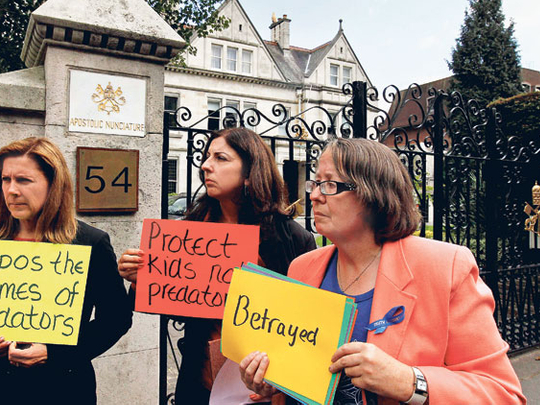
London: When Benedict XVI lands at Edinburgh airport on Thursday, he is unlikely to get the rapturous reception that greeted John Paul II on his pastoral visit to Britain in 1982.
Over the coming days, the pope will not only be faced with protesters demanding action on clerical sexual abuse of children and the £20 million (Dh112 million) cost of the state visit, he must also contend with public apathy.
A recent survey revealed that 77 per cent of those questioned felt that the taxpayer should not contribute to the cost of the visit, with 79 per cent saying they had "no personal interest" in the pontifical trip.
Rare chance
But others believe Benedict's trip provides a rare chance to put the Vatican in the spotlight and ask the pope difficult questions. Human rights activists, secularists, survivors of clerical sexual abuse and reform-minded Catholics have formed a loose coalition to ensure the opportunity is not wasted.
The movement is spearheaded by Protest the Pope, a group with nearly 9,000 Facebook members that is planning a march in London time to demonstrate against the visit.
Disparate as many of the constituent groups of Protest the Pope are from Doctors4Justice to Southall Black Sisters they appear to agree that child abuse is at the top of their list of grievances.
Terry Sanderson, president of the National Secular Society and a leader of Protest the Pope, said that while secularists objected to the government co-funding a religious visit, there sex abuse was "the one thing that the pope personally needs to answer for.
He said that penance is a better approach to child abuse than altering the structures of the church. We are being told constantly that the church has changed its ways, but he's saying that they're not changing their ways."
They appear to agree that the child sexual abuse of children is at the top of their list of grievances.
Andrew Copson, chief executive of the British Humanist Association, sees the abuse as "another good example of how the Holy See uses its powers to frustrate justice".
Copson, who does not believe that the Vatican should be recognised as a state, wants to use the visit to question its status and practices.
Personal interest
"We hope that people will realise that Pope Benedict is not just the head of a religion that has many adherents and does a lot of good work, but that he and the Holy See use their powers to make people's lives worse," he said.
Others have a more personal interest in seeing the pope held to account. "There have been words of apology and statements, but as survivors, and for survivors, we want something substantive to come from the church," said Anne Lawrence, chair of the support groups MACSAS (Minster and Clergy Sexual Abuse Survivors).
"We want them to commit themselves to finding out how many victims there are. We want the pope to say what he will do for victims of abuse."












